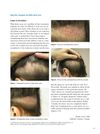 January 2023 in “Zdravstvena zaštita”
January 2023 in “Zdravstvena zaštita” Aging-related hormone changes affect voice quality, especially during puberty, menstruation, pregnancy, and menopause.
 December 2022 in “Journal of Education, Health and Sport”
December 2022 in “Journal of Education, Health and Sport” Covid-19 can cause different types of hair loss, which can affect people's mental and social well-being.
 February 2021 in “Journal of nursing education and practice”
February 2021 in “Journal of nursing education and practice” Women and men experience different quality of life and symptom distress after kidney transplant with immunosuppressive therapy.
 August 2019 in “Reactions Weekly”
August 2019 in “Reactions Weekly” Oral minoxidil for hair loss caused mild side effects in some men, but most continued treatment.
 June 2016 in “Experimental Dermatology”
June 2016 in “Experimental Dermatology” Changing hair follicle identity could potentially reverse balding.
 April 2016 in “Journal of The American Academy of Dermatology”
April 2016 in “Journal of The American Academy of Dermatology” Lichen planus may be associated with a higher risk of metabolic syndrome.
November 2015 in “Australasian Journal of Dermatology” Lichenoid keratosis can cause localized hair loss.
April 2015 in “Dentistry 3000” Premature hair graying in the face may be influenced by genetics and environment.
 January 2015 in “Hair therapy & transplantation”
January 2015 in “Hair therapy & transplantation” Hair restoration greatly improved George's confidence and self-identity.
June 2014 in “The Journal of Dermatology” A patient with a rare chromosome condition also had a rare type of hair loss.
 January 2014 in “International Journal of Trichology”
January 2014 in “International Journal of Trichology” A man had an unusual type of hair loss that didn't match known patterns and didn't improve with treatment.
 July 2012 in “Dermatologic Surgery”
July 2012 in “Dermatologic Surgery” The author believes artificial dermis might not be the best first option for hair transplant surgeons when other surgical choices exist for scalp reconstruction.
 May 2012 in “The journal of nervous and mental disease”
May 2012 in “The journal of nervous and mental disease” The book provides comprehensive information on Impulse Control Disorders but lacks definitive evidence for effective treatments.
 January 2011 in “Dermatologic Surgery”
January 2011 in “Dermatologic Surgery” The book is an excellent resource for all levels of hair restoration surgeons.

The project improved provider knowledge about PCOS but didn't significantly change diagnosis and management practices.
 June 2008 in “The Journal of Urology”
June 2008 in “The Journal of Urology” Men with urinary symptoms are more likely to have erectile dysfunction, and there's a debate about research methods and authorship ethics.
 May 2005 in “Seminars in Plastic Surgery”
May 2005 in “Seminars in Plastic Surgery” Dr. Alfonso Barrera was recognized for his expertise and contributions to hair transplantation and plastic surgery.

research Re
September 2003 in “Dermatologic Surgery” The letter criticizes generalizations about older patients' abilities and calls for respectful, individualized care, while the original authors defend the need to adapt communication for those with impairments.
 July 2000 in “Dermatologic Surgery”
July 2000 in “Dermatologic Surgery” Dr. Yarborough denied endorsing Derma Genesis and was mistakenly represented due to his office manager's error; also, over 30% of tested skin products were contaminated with bacteria.
 May 1999 in “Dermatologic Surgery”
May 1999 in “Dermatologic Surgery” The cell culture medium "RPMI" might slightly improve hair graft survival, but not by a significant amount.
 May 1999 in “Dermatologic Surgery”
May 1999 in “Dermatologic Surgery” Using an ultrasonic liposuction machine with different cannula sizes and power settings does not change water temperature.
 May 1999 in “Dermatologic Surgery”
May 1999 in “Dermatologic Surgery” Dr. Zitelli emphasized that "Mohs surgery" should only be called that when one doctor does both the surgery and pathology.
 176 citations,
June 2017 in “Sexual Medicine Reviews”
176 citations,
June 2017 in “Sexual Medicine Reviews” Erectile dysfunction is increasingly common in men under 40, with many physical and psychological causes, and various treatment options available.
 26 citations,
September 2015 in “Journal of The American Academy of Dermatology”
26 citations,
September 2015 in “Journal of The American Academy of Dermatology” Spironolactone may effectively treat female hair loss, especially with hyperandrogenism signs.
 20 citations,
May 2000 in “Journal of The American Academy of Dermatology”
20 citations,
May 2000 in “Journal of The American Academy of Dermatology” Orf infections can happen during the Muslim event 'Aid el Kebir' due to close contact with sheep.
 19 citations,
December 2008 in “Journal of The American Academy of Dermatology”
19 citations,
December 2008 in “Journal of The American Academy of Dermatology” The authors suggest that a new type of hair loss exists, which is different from alopecia areata.
 19 citations,
December 1985 in “Journal of The American Academy of Dermatology”
19 citations,
December 1985 in “Journal of The American Academy of Dermatology” Minoxidil can cause scalp comedones and acne.
 18 citations,
March 1984 in “BMJ”
18 citations,
March 1984 in “BMJ” Minoxidil helps hair regrowth in alopecia, but more research needed.
 16 citations,
March 2006 in “The American journal of psychiatry”
16 citations,
March 2006 in “The American journal of psychiatry” Lowering the dose of ziprasidone can cause sudden restlessness and urge to move in patients.
 11 citations,
June 2008 in “Dermatologic Surgery”
11 citations,
June 2008 in “Dermatologic Surgery” Transplanting chest hair into scalp scars may effectively treat wide donor scars in hair restoration.



























